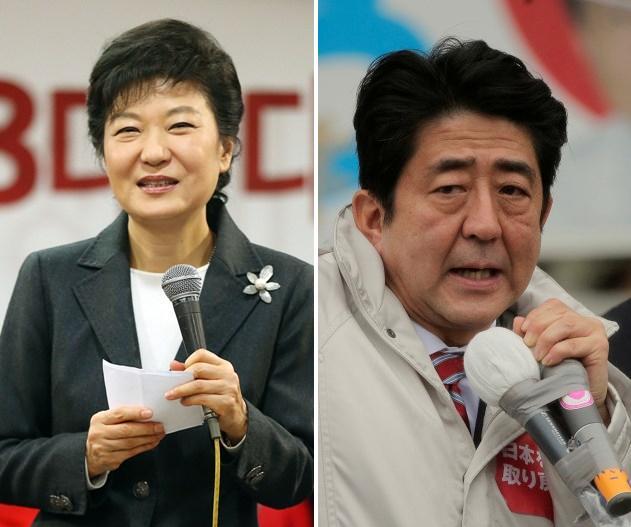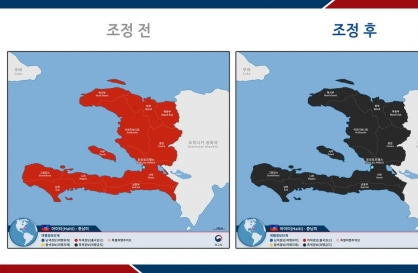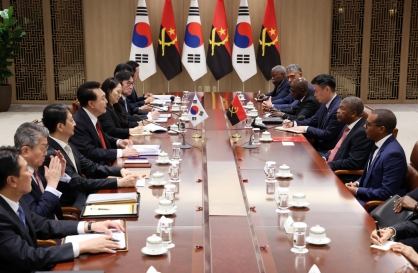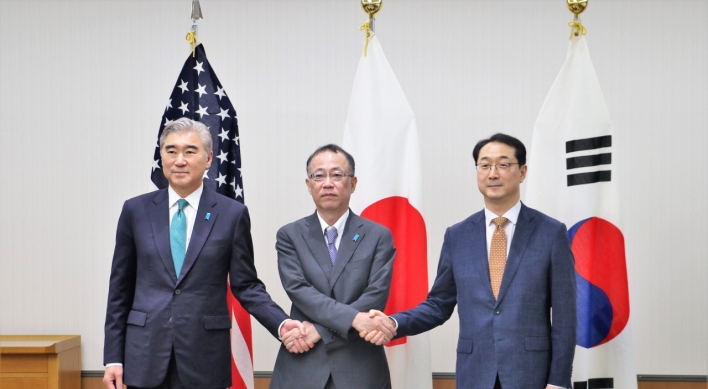President-elect Park Geun-hye has turned down a visit by incoming Japanese Prime Minister Shinzo Abe’s special envoy, heralding a rough ride in the relations between the next governments of the two nations.
Shinzo Abe of Japan’s Liberal Democratic Party planned to send his congratulatory letter last weekend via former Finance Minister Fukushiro Nukaga and three other senior members of the Japan-South Korea parliamentarians’ association.
But Park’s side “respectfully” declined the meeting due to her “extremely tight schedule.”
Relations between Seoul and Tokyo have turned frosty due to their friction over Korea’s islets of Dokdo and Japan’s refusals to atone for atrocities during its 1910-1945 colonial rule.
Shinzo Abe of Japan’s Liberal Democratic Party planned to send his congratulatory letter last weekend via former Finance Minister Fukushiro Nukaga and three other senior members of the Japan-South Korea parliamentarians’ association.
But Park’s side “respectfully” declined the meeting due to her “extremely tight schedule.”
Relations between Seoul and Tokyo have turned frosty due to their friction over Korea’s islets of Dokdo and Japan’s refusals to atone for atrocities during its 1910-1945 colonial rule.

“Nukaga contacted us Thursday, a day after the presidential election, that four lawmakers including him wished to visit Park this weekend with Abe’s letter,” one of her aides was quoted as saying by Yonhap News on Friday.
“(After learning that the meeting will not be possible) I delivered her message that it’d be better to rearrange the plan after Abe’s official inauguration slated for Wednesday.”
The dispatch, which contained Abe’s “will to normalize the two countries’ relations,” was later handed over to Park in Seoul by Japan’s ambassador Koro Bessho.
Officials with her Saenuri Party denied any political backdrop behind her refusal.
But even with her indeed crowded schedule, the president-elect should have taken account of mounting concerns over Abe’s international reputation as a staunch nationalist and Japan’s newfound lust for a rightward shift, observers say.
The decision also paints a stark contrast with her agreement with U.S. President Barack Obama to reinforce the two countries’ alliance and “meet in the near term” during a telephone conversation on Friday.
The future of Korea-Japan ties appears to be hanging in the balance with the LDP, buoyed by its sweeping election win a week ago, set to make real its giant package of hawkish foreign and territorial policies.
Abe articulated his desire to rewrite the country’s pacifist constitution to boost defense spending and expand the use of its Self Defense Forces. He has also vowed to visit the Yasukuni Shrine honoring top war criminals, revise a watershed 1993 apology for war crimes and hold a nationwide Takeshima Day claiming Japan’s sovereignty over Dokdo.
During a news conference last month, Park reiterated that Dokdo is “not subject to negotiation because the islets are Korea’s indigenous territory in terms of territory, geography and international law.”
“Koreans have a memory that their country’s colonization began with Japan’s seizure of Dokdo in 1905. I’d like Japan, which is a friendly nation of Korea’s, to look squarely at this for the sound development of the two countries’ relations.”
Abe, for his part, appears to be making efforts to prevent his campaign pledges from eroding ties with its neighbors.
On Friday, the premier-in-waiting hinted at shelving the plan to upgrade Takeshima Day from a local level to nationwide on Feb. 22, which will likely further sour bilateral ties by coinciding with Park’s presidential inaugural ceremony on Feb. 25.
He will make a decision “considering the overall foreign relations situation,” he told reporters in Tokyo.
Abe has also postponed a scheme to have public servants reside on the Senkaku islands, the center of a flaring dispute in the East China Sea called Diaoyu by the Chinese. He reportedly plans to send an envoy to Beijing in January.
“Given some time remaining, talks (between Park and Abe) are necessary because plans such as one for the national Takeshima Day will likely deteriorate bilateral relations even though the Japanese leadership is under pressure to follow through on its campaign promises,” said Jin Chang-soo, a senior fellow at the independent Sejong Institute.
“There’s room for self-restraint though as the U.S. wouldn’t want to see its two allies clash over historical problems at a time when their trilateral cooperation is extremely important,” he said, citing North Korea’s recent rocket launch and other continuous provocations.
By Shin Hyon-hee (heeshin@heraldcorp.com)


















